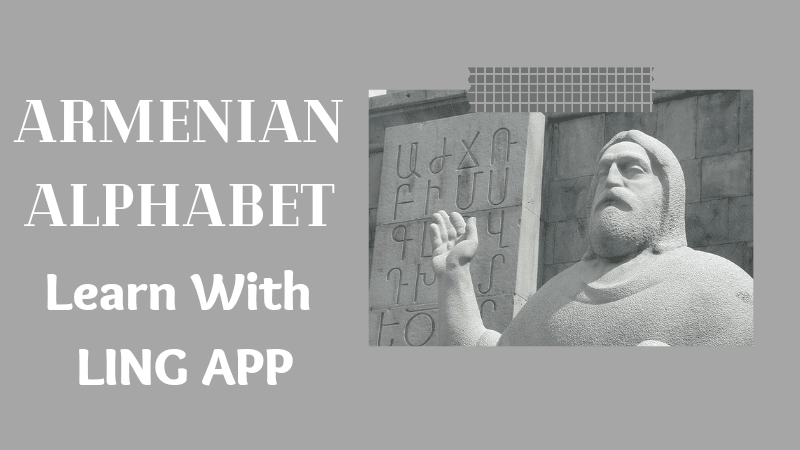Being a language learner, you must come across several questions, including, “is Armenian hard to learn?” In this blog, we will walk you through all the reasons that might make you think that Armenian is a hard language to learn and all the best ways to crush this language in no time. If you are ready for that, then let’s start learning!
To answer the question in the introduction, allow me to affirm and tell you honestly that Armenian is hard to learn. The Armenian language can be tricky for most learners, mainly if their native language is not based on the Indo-European family. As you probably know, this language has a long history, so many of its words are deeply rooted in the country’s traditions, beliefs, and history.
Another major thing to note is that the Armenian language is somewhat tricky when used in textbooks and real-life conversations. Somehow, the informal and formal language has vast differences, which can be very tough. On top of that, the language uses a wide range of alphabets, making some of the words and expressions impossible to pronounce for beginners.
Indo European Language Family
The Armenian language belongs to the Indo-European family and is also spoken in many other countries like Turkey, Russian, Georgia, and Iran. As an Indo-European language, it shares some resemblance with Greek, Latin, Sanskrit, and Gothic.
Given its history, the ancient Armenian texts can even be seen in the fifth-century Bible translations. There are two main versions of the Armenian language known as the Eastern Armenian and Western Armenian. The old Armenian utilized the Grabar writing system.
Armenian Language Alphabets

Armenian language alphabets are hard to learn due to their wide range because there are around 38 letters consisting of 7 vowels and 31 consonants. Armenian language alphabets are considered confusing because they are similar when written down. Also, their set of letters is far different than those from Latin or Cyrillic.
Phonology
The pronunciation of most of the Armenian language alphabets can be tricky for foreigners. There are many similar pronunciations for different words with slight soft and hard pronunciations for each Armenian alphabet. Pronouncing one hard pronunciation instead of a soft one can completely change the meaning of the entire word.
Vowels aren’t considered difficult, but consonants can be difficult sometimes. Some consonants sound similar to English speakers, and it can be difficult to distinguish between two different letters. Pronouncing consonants can be a real deal for speakers of other languages.
Syllables And Word Order
The Armenian language has different ways to write words and conjugate syllables in grammar. For instance, the last syllable carries all the stress of the word. While pronouncing a word, we have to stress the final syllable. This is avoided if the last syllable has [ə] or [n]. [ə] and [n] are two Armenian alphabets that are also definite grammar articles.
Such out of ordinary technicalities make this language slightly difficult as well.
Armenian Punctuation
The punctuation marks used in the Armenian language are not the same as in English. The alphabet and numbers in the Armenian language and the punctuation marks in Armenian are one of a kind. However, some might resemble the symbols used in English, but their purpose is completely different.
The English language uses a colon symbol “: ” to describe the other parts of a particular thing. That is not the case in the Armenian language. Armenians use the same symbol, but instead of providing explanations, it is used to end a sentence in the Armenian language script. Therefore, it serves as a complete stop in the Armenian language.
Numerical Use
While almost all the languages entire world uses various numbers (Arabic numerals etc.), in Armenia, this Indo-European language uses alphabets. In Armenia, people use the alphabet to write numbers. They make calculations using these alphabets.
This can be quite challenging if you wish to study mathematics in Armenia. There are countless written texts which use the alphabet as a number system.
Dialects In Armenian
Armenian is split up into different dialects. These are different from old Armenian. Two standard dialects are Eastern Armenian accents and Western Armenian accents. Many people often wonder which dialect to follow while learning Armenian. Here is a quick guide about the differences between both the languages;
Eastern Armenian And Western Armenian
Eastern Armenian is widely spoken in Armenia, Georgia, and Iran. On the other hand, Western Armenian is widely spoken by Armenian communities living in the United States, Europe, the Middle East, and Australia.
The significant differences between Eastern Armenian and Western Armenian have alphabets that are pronounced differently, different forms of words, and vocabulary preferences. Native speakers correctly pronounce Armenian, while Western Armenian speakers do not use all the consonants of classical Armenian.
Most people learn Eastern Armenian since that is closest to the original one and also spoken by most of the people in Armenia.
Grammatical Gender

The good thing about Armenian grammar is that it does not involve too many grammatical gender conjugations and specifications. This is good news for all the learners who fear Armenian grammar.
There is no gender in Armenian, not even for pronouns, so grammar isn’t that complicated in this aspect. Still, it can be challenging when it comes to verbs because it contains many features that aren’t present in English grammar.
Literary Armenian
In Armenia, the spoken language is different from the language taught in schools and other formal places. In schools, literary Armenian is taught, which has different rules compared to the casual one. This distinction also makes Armenian one of the hardest languages in the world.
You cannot learn Armenian without learning literary Armenian. You can speak Armenian, but to read books and newspapers and watch television, knowing the basics of literary Armenian can come in handy.
Role Of Context And Spirit
One of the most strange things about the Armenian language is the belief in spirits in everyday life. The Armenian language is relatively simple, but at the same time, its simplicity makes it complex because of a lack of specifications.
The Armenian language speakers often say something that might not be entirely understandable for the native Armenian language speakers, let alone the new learners. The people believe that the spirits will carry their intentions and meanings to the listener even if they do not understand that.
This is an excellent cultural insight into the uniqueness but at the same time does not help with the language learning and needs to be picked up after some years of learning the Armenian language. Learning the Armenian language is also obtained through the experience and the hard work put into the language.
Is Armenian Hard To Learn?
The Armenian language is not an easy language to get into. It is also considered one of the most complex languages globally because it requires commitment, determination, proper guidance, and patience. All of these factors are especially helpful while learning the Armenian language.
You would have to submerge yourself completely into the language. Here are some of the ways through which you can ace this hard language:
Gaining The Vocabulary
Gaining as much vocabulary as possible is a good tip for every language. In Armenia, learning many words is especially helpful because the people in Armenia use different spelling and words, which are often closely related. Once you get the hang of essential words in Armenian, you can often combine them to make new words.
For instance,արեւածաղիկ • (arewacałik) has the formation of two basic words արեւ (arew) + -ա- (-a-) + ծաղիկ (całik). արեւածաղիկ means sunflower. արեւ (arew) means sun, -ա- (-a-) is an agglutinating interfix and ծաղիկ (całik) means flower. See? Easy, isn’t it?
Talking To Native Speakers
Since the cultural aspect of Armenia has some influence on the spoken Armenian language, it should be kept in mind that the Armenian language is learned while also talking to the speakers/ Armenians. Armenians can help you a lot with how to pronounce each Armenian alphabet.
When you speak to the speakers, you realize how different accents in the Armenian language sound. You can get all the minor details that might be missing elsewhere.
Making Notes
You need to make notes about all the aforementioned complex elements of the Armenian language. Once you do that, you can start to learn Armenian. Start with the Armenian alphabet. Learn each Armenian alphabet and then write about them.
Indo-European Armenian alphabet would require you to write again and again. Practice is the key because these alphabets are not like the Armenian alphabet in any other language. You can try writing each alphabet and ten different words with that. The more you’d write, the better memory you would have for that alphabet.
You can also write an Arabic numeral along with its Armenian alphabet equivalent. Also, hand-written notes are beneficial. When you have your hand-written notes for each number, your motor memory will help you write and recognize them the next time you try.
Wrapping Up
Ready to learn Armenian and speak to native Armenians? By now, you have a perfect guide that you can use as a starting point for learning Armenian. You can get help from the Ling app by Simya Solutions. The Ling App provides lessons for almost all the languages globally, including Armenian. There are proper lessons in all the languages for both written and oral use.
So, what are you waiting for? Download the Ling App today and discover why it is a featured app in the stores today!

















